Every dog owner has noticed a wet spot of their dog’s saliva on their pillow at some point.
No matter how much you adore your furry friend, their constant pillow licking can get pretty annoying. What causes this odd behavior, and what can you do to get your dog to stop doing it?
There are many reasons why dogs enjoy licking their owners’ pillows and bedding. The primary reason is that dogs simply enjoy salty things.
Since your pillow has traces of your sweat, it tastes salty to them. Alternatively, your dog may be bored, anxious, or even detect food crumbs on your pillow.
If you’re tired of your dog licking your pillows, keep reading. Some habits can be tough to break, but thankfully, you have plenty of options to redirect your dog’s behavior.
Why Dogs Lick: An Overview
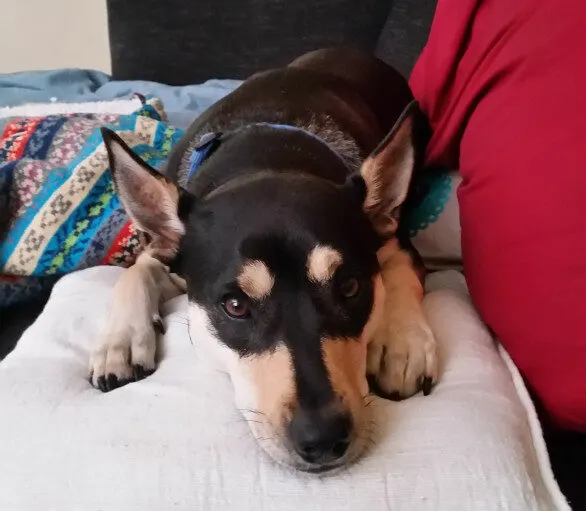 It’s no secret that dogs will lick just about anything. Since they don’t have opposable thumbs like us humans, they interact with their environment a bit differently.
It’s no secret that dogs will lick just about anything. Since they don’t have opposable thumbs like us humans, they interact with their environment a bit differently.
Interestingly, dogs’ sense of taste isn’t nearly as refined as their sense of smell. While humans have around 9,000 taste buds to discern tastes, dogs only have around 1,700 or so.
Still, though, this doesn’t stop them from licking everything they can.
Dogs are able to learn a lot about something by its taste alone. Licking is a natural behavior passed down from their wolf ancestors.
Dogs lick to groom, play, and communicate with each other, but they also lick to soothe themselves or express affection.
Basically, licking is one of your dog’s primary ways of learning about its surroundings. They lick to better understand and interact with other dogs, their environment, and even you.
Why Your Dog Licks Pillows and Bedding
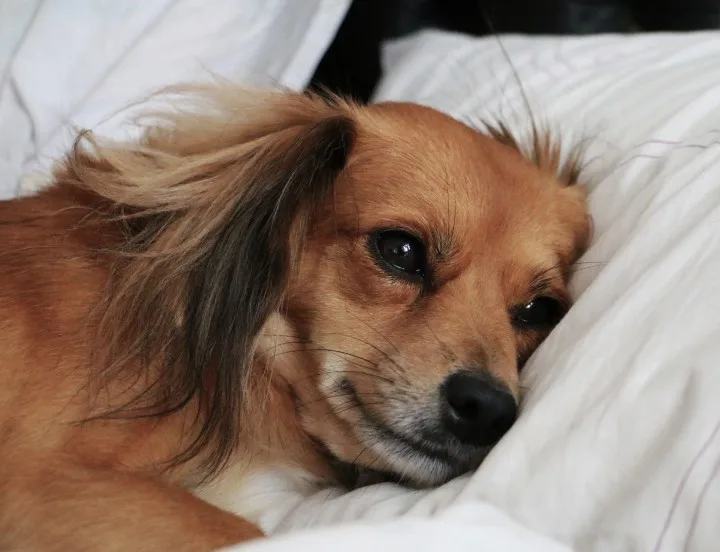 You now have a basic understanding of why dogs lick in general. However, you’re probably still wondering why they enjoy licking your pillows and sheets so much, specifically.
You now have a basic understanding of why dogs lick in general. However, you’re probably still wondering why they enjoy licking your pillows and sheets so much, specifically.
There are a variety of reasons for this behavior. Some dogs will lick things like pillows out of sheer boredom.
Others simply enjoy the taste of salt from your sweat that has accumulated in your bedding over time.
Additionally, licking objects like pillows, couches, or carpet are soothing to some dogs. This is especially true for dogs prone to separation anxiety.
Overall, though, most of these reasons aren’t a cause for alarm. Most of them can even be corrected with a bit of training or changes in you and your dog’s routine.
Next, we’ll explore six of the most common reasons why dogs lick pillows.
Stress and Anxiety Relief
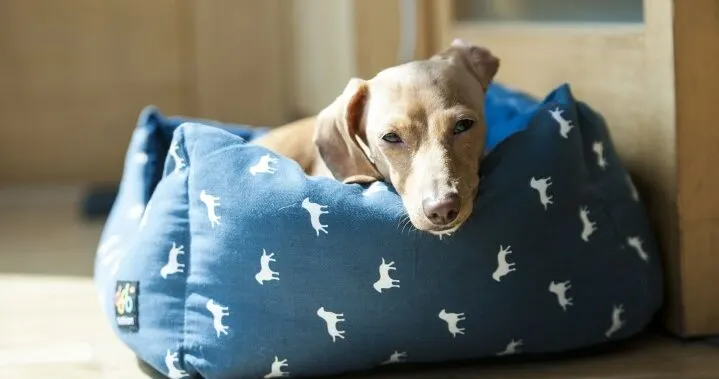 Oddly enough, licking textured surfaces like fabric is extremely soothing to most dogs. Whether it’s your pillow or your carpet, you might have noticed your dog licking the same spot for hours.
Oddly enough, licking textured surfaces like fabric is extremely soothing to most dogs. Whether it’s your pillow or your carpet, you might have noticed your dog licking the same spot for hours.
One of the most common reasons why dogs lick these surfaces is because it relieves anxiety and stress. It’s a repetitive, calming behavior for them.
Think of how humans with anxiety tend to pick at their skin or bite their nails. Licking is the equivalent of this for your dog!
Has your dog experienced any major life changes lately? For example, have you adopted a new pet or moved into a new home?
If so, this could be why your dog is licking your pillow more often than usual.
Your Pillow Is Salty From Your Sweat
The main reason why dogs lick things in general, is that they enjoy the taste. In the case of your pillow and sheets, your dog enjoys the salty taste of your sweat.
Over time, your bedding accumulates tiny bits of sweat, hair, and dead skin. Dogs love things that taste salty, and they can smell the traces of salt produced by your body.
As a result, they will lick the spots that smell the saltiest because it tastes good to them.
Even if you wash your bedding fairly regularly, remember that your dog has a very strong sense of smell. This means they can smell your sweat even if you can’t!
Food Crumbs On Your Pillow
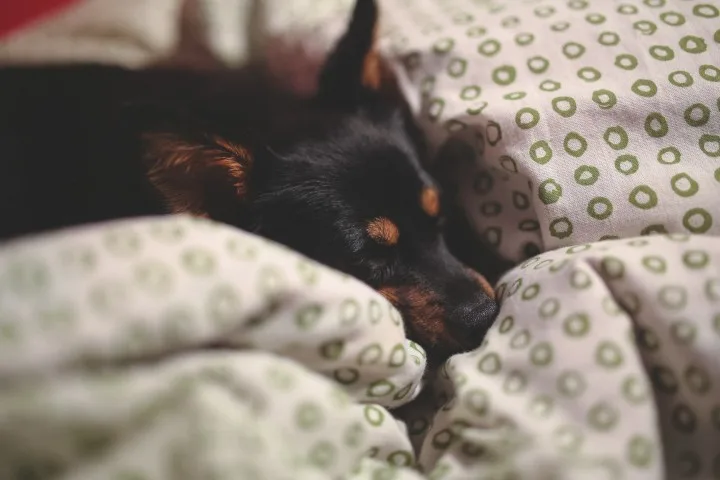 Another reason why dogs lick things is that they smell food particles on them. If you’re prone to eating in bed often, your dog will lick tiny food crumbs off your pillow and sheets.
Another reason why dogs lick things is that they smell food particles on them. If you’re prone to eating in bed often, your dog will lick tiny food crumbs off your pillow and sheets.
They will even learn over time that they can lick the pillow for a tasty reward.
Now, you might be thinking, “But there’s no food in my bed!” Remember, your dog’s sense of smell is far sharper than yours.
Even if the crumbs aren’t visible to your naked eye, your dog can definitely smell them.
Boredom
A bored dog will find ways to occupy itself, even if those ways are destructive. Thankfully, pillow licking is more annoying than destructive.
Still, finding those wet spots on your pillow every night can be pretty unpleasant.
Licking is especially common in dogs who are bored. It is especially common in energetic breeds like golden retrievers or pit bulls who require regular exercise and stimulation.
Regardless of breed, though, many dogs simply don’t handle boredom well. To keep themselves busy, many will start licking things like pillows, carpets, and furniture.
Separation Anxiety
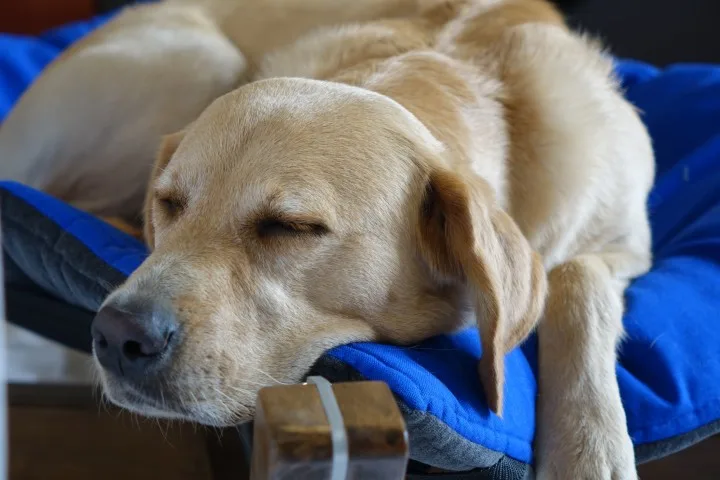 Does your dog panic when you leave the house? Do you often come home to see toys, furniture, or even your belongings torn to pieces?
Does your dog panic when you leave the house? Do you often come home to see toys, furniture, or even your belongings torn to pieces?
If so, there’s a good chance your dog is licking your pillows in the meantime, too.
Many dogs form close bonds with their owners. As a result, they don’t tolerate being away from their favorite people for long.
Your dog may even lick your clothing or bedding simply because it smells like you. Since your scent is soothing to your dog, they will lick your pillows to calm themselves when you’re away.
Obsessive-Compulsive Disorder
Many people aren’t even aware obsessive-compulsive disorder occurs in dogs. Surprisingly, OCD is quite common in animals!
As you might imagine, pillow licking can be a compulsive behavior for dogs with this disorder. Over time, the behavior becomes obsessive and repeated.
Many dogs with OCD will repeat actions like pillow licking or pacing back and forth to soothe their symptoms.
Generally, it’s best to get an official diagnosis if you suspect your dog has OCD. Consult with a vet for a diagnosis and potential treatment plan moving forward.
Getting Your Dog To Stop Licking Your Pillows: 6 Tips
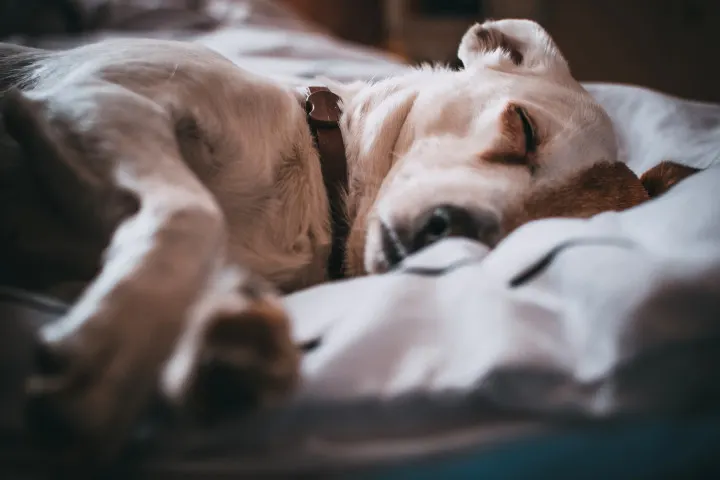 Simply knowing why your dog licks your pillows isn’t enough to curb this unpleasant behavior. You’ll also need to redirect your dog’s boredom and anxiety to a more positive outlet.
Simply knowing why your dog licks your pillows isn’t enough to curb this unpleasant behavior. You’ll also need to redirect your dog’s boredom and anxiety to a more positive outlet.
Fortunately, you have plenty of options at your disposal. Let’s explore what you can do to get your dog to quit leaving those droopy wet spots on your bedding.
Granted, this may take some troubleshooting, but in the end, you and your dog will both be happier.
Tip 1: Wash Your Bedding More Often
Generally, it’s recommended that you wash your bedding every one to two weeks. Over time, your body sheds dead skin, hair, and sweat that soaks into your sheets and pillows.
One way to deter your dog from licking your pillows is to simply wash them more frequently.
By doing this, you’ll eliminate that salty smell your dog loves so much. In turn, they will ideally direct their attention elsewhere.
Tip 2: Keep Your Dog Away From Your Bedding
It’s understandable if you share your bed with your dog at night. It’s a great way to bond with your pet, and dogs are great cuddlers.
However, it’s best to lock your dog out of your room when you’re not around. Restricting their access to your pillows will keep them from licking them.
Consider giving your dog an old shirt that smells like you. This way, they’ll lick the shirt instead. Plus, they won’t try to break your bedroom door down when you’re at work to get to your pillows.
Tip 3: Prevent Boredom With Toys and Play
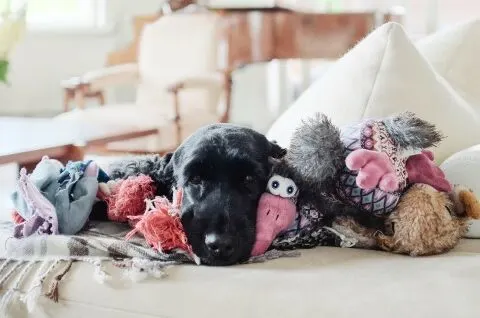 As we mentioned earlier, a bored dog will find ways to stay busy. If you don’t have toys to keep them occupied, they will resort to behaviors like the dreaded pillow licking.
As we mentioned earlier, a bored dog will find ways to stay busy. If you don’t have toys to keep them occupied, they will resort to behaviors like the dreaded pillow licking.
Try out lots of different types of toys to find which one your dog likes best. Puzzle toys that dispense treats are great because they keep dogs busy and full while you’re away.
Another great way to keep your dog occupied is to up their exercise sessions. Instead of walking them for 20 minutes as usual, walk them for 30 or 40 minutes.
Incorporate those toys you bought to teach your dog what they are allowed to play with.
Tip 4: Use Training To Break The Habit
Simple obedience training goes a long way in breaking destructive habits. Better yet, use treats and other rewards to teach them that they aren’t supposed to be licking your pillow.
For example, divert your dog’s attention if you notice them heading for your pillow. Once they leave it alone, reward them with a treat and praise.
Repeat this every time you see them trying to lick your pillow until they learn to stop.
Over time, your dog will learn they get rewarded for abandoning a destructive behavior. Eventually, they’ll ignore your pillows altogether!
Above all else, remember to be patient. The longer your dog has exhibited this habit, the longer it’ll take to break.
Tip 5: Change Up Your Dog’s Diet
If your dog is bored with their food, it will look elsewhere for something to stimulate its taste buds. Try changing their food and/or treats to get them interested in their meals again.
For example, if your dog barely touches their food at dinner, it might be time to try something new. Experiment with different flavors and textures!
Tip 6: If All Else Fails, Call Your Vet!
In the end, some issues can’t be resolved on your own. If, after trying all of these tips, your dog is still engaging in pillow licking, call up your vet.
In some cases, an underlying health issue could be to blame for the behavior.
For example, if your pup has severe anxiety, your vet might prescribe medication for them. Alternatively, they may suggest a different diet or changes to your routine.
Our team is composed of pet care professionals, veterinarians, and pet owners. To date, we’ve conducted thousands of hours of research to publish the most accurate pet information.
Most of the writers on our site are vets with 10+ years of clinical experience, ranging from small practice, to equine practice, academia, and surgery. Our goal is to help every pet owner get the information they seek about their dear companions.

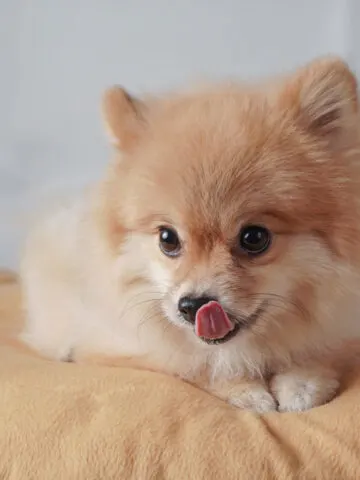

Leave a comment
You must be logged in to post a comment.